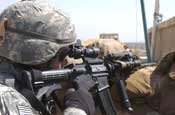For many people, having access to GI benefits after serving their country is a primary factor behind joining the service. But some guard members are finding out that they're not eligible because of a glitch in the new GI bill.
Those benefits, which include funds for higher education and vocational training for veterans and their families, are only available to those activated under Title 10 to serve in Afghanistan and Iraq. Soldiers activated under Title 32responding to domestic emergencies or to homeland security missions, or serving full time under the Active Guard and Reserve programare not eligible for the Post-9/11 GI Bill, reports the Sun Herald
Excluded are Guard members called up to protect the homeland during Operation Noble Eagle after the 9/11 attacks, as well as Guard members activated to respond to Hurricane Katrina in 2005, and 6,000 called up for Operation Jump Start to bolster border security with Mexico in 2007 to 2008.
"Title 32 active duty status means they are on active duty, paid by the federal government but they still technically come under the command and control of the governor," said Peter Duffy, deputy legislative director of the National Guard Association of the United States. "Much of what the Guard does domestically and even some overseas tours are done on Title 32 status. And although it takes members away from families, and it involves some risk, and it has them doing what counterparts in the active force are doing domestically, it still doesn't give them (GI Bill) benefits. It's a big, big gap."
Data from the Army National Guard and Air National Guard show that 75,098 Army Guard members and 2,460 Air Guard members will not be entitled to the new GI Bill without a legislative fix, says the Government Accountability Office in a July 6 letter report detailing recent gains in Reserve and Guard compensation.
Most of the ineligible Guard members provided security for domestic airports, power stations and other areas deemed at risk after 9/11. The soldiers were funded by the federal government, but were under control of state governors, who deployed them as necessary.
The story does say that the Defense Department "plans to offer a legislative fix with its 2011 budget."



Comments
Use the comment form below to begin a discussion about this content.
comments powered by Disqus